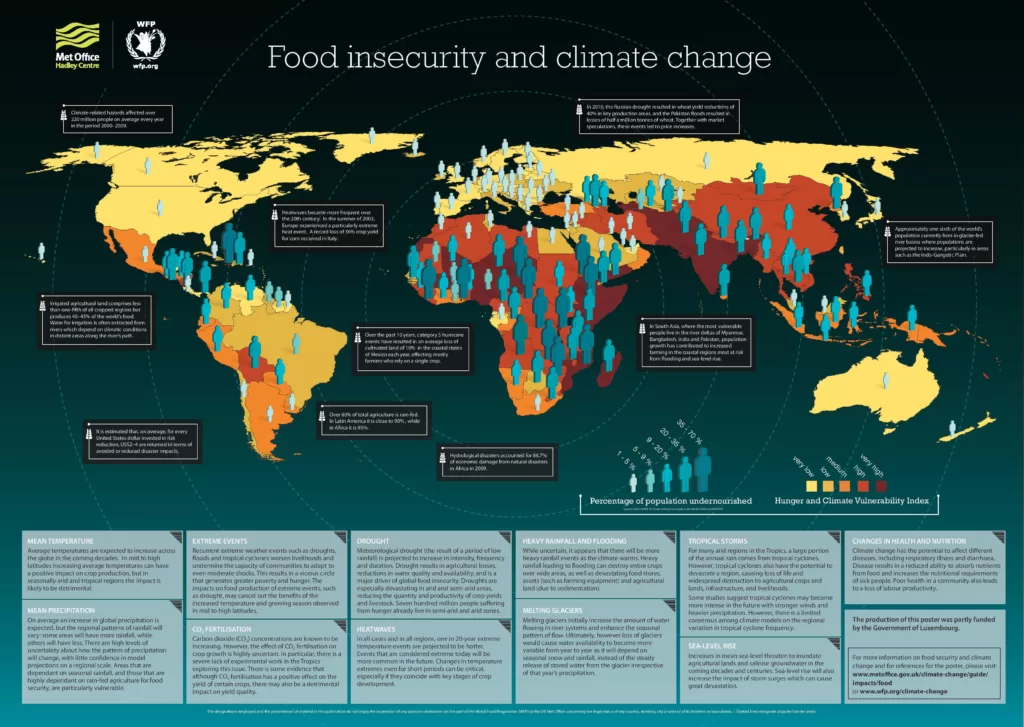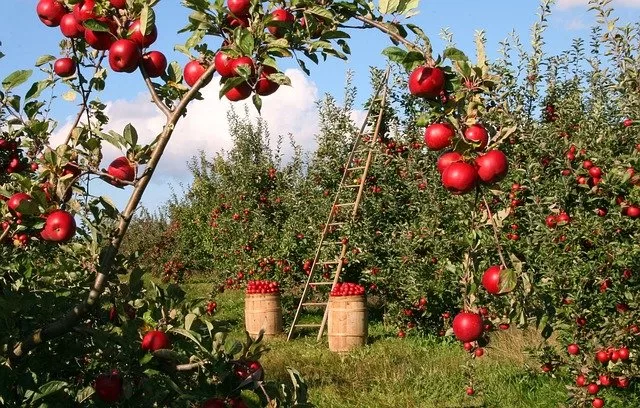A new report released by the United Nations has warned of the potentially devastating impact of climate change on global food security. The report highlights the need for urgent action to mitigate the effects of climate change on food production, distribution and consumption. It also calls for increased investment in sustainable agriculture and food systems to ensure the long-term security of the world’s food supply.
Table of Contents
1. Climate Change: A Growing Threat to Food Security
The report warns that climate change is already having an impact on global food security, with rising temperatures, changing rainfall patterns and more frequent extreme weather events all contributing to reduced crop yields and increased food insecurity. It notes that the effects of climate change are likely to be felt most strongly in the world’s poorest countries, where access to food is already limited.
2. Urgent Action Required
The report calls for urgent action to mitigate the effects of climate change on food security. It recommends increased investment in sustainable agriculture and food systems, such as agroforestry and agroecology, to ensure the long-term security of the world’s food supply. It also calls for the implementation of measures to reduce greenhouse gas emissions, such as the use of renewable energy sources and the promotion of sustainable land use practices.
2. Examining the Impact of Climate Change on Food Security
The report also examines the potential impacts of climate change on food security in different regions of the world. It notes that the effects of climate change are likely to be felt most strongly in the world’s poorest countries, where access to food is already limited. It also highlights the potential for increased food insecurity in areas where populations are growing rapidly, such as sub-Saharan Africa and South Asia. The report calls for increased investment in research and development to better understand the impacts of climate change on food security and to develop strategies to mitigate these impacts.
3. Climate Change and its Impact on Food Security
The report concludes that climate change is already having a devastating impact on global food security. It calls for urgent action to mitigate the effects of climate change on food production, distribution and consumption. It also recommends increased investment in sustainable agriculture and food systems to ensure the long-term security of the world’s food supply. The report emphasizes the need for governments, businesses and individuals to take action to reduce greenhouse gas emissions and to promote sustainable land use practices.
4. Climate Change: Uncovering its Impact on Food Security
The report provides a comprehensive overview of the impact of climate change on food security. It examines the potential impacts of climate change on food production, distribution and consumption in different regions of the world. It also calls for urgent action to mitigate the effects of climate change on food security and to promote sustainable agriculture and food systems. The report emphasizes the need for governments, businesses and individuals to take action to reduce greenhouse gas emissions and to promote sustainable land use practices.
5. Climate Change: Unveiling its Effects on Food Security
The report provides a comprehensive overview of the impact of climate change on global food security. It examines the potential impacts of climate change on food production, distribution and consumption in different regions of the world. It also calls for urgent action to mitigate the effects of climate change on food security and to promote sustainable agriculture and food systems. The report emphasizes the need for governments, businesses and individuals to take action to reduce greenhouse gas emissions and to promote the use of renewable energy sources and sustainable land use practices.
What are the major factors affecting food security?
Food security is a complex issue, and there are a number of factors that can affect it. These include economic factors such as poverty, income inequality, and access to resources; environmental factors such as climate change, natural disasters, and land degradation; and political factors such as trade policies, conflict, and government regulations. All of these factors can have a direct or indirect impact on food security, and it is important to consider them when looking at ways to improve food security.
What are the potential impacts of climate change on agriculture?
Climate change is having a significant impact on agriculture, with rising temperatures, changing precipitation patterns, and extreme weather events all contributing to increased risks to crop and livestock production. Higher temperatures can lead to increased water stress, reduced soil moisture, and increased pest and disease outbreaks, while changing precipitation patterns can lead to drought or flooding. Extreme weather events, such as heat waves, can also cause crop losses and damage to infrastructure. These impacts can have a direct effect on food production, as well as an indirect effect on food prices, food security, and nutrition.
II. New Report
The new report, released by the United Nations Environment Programme (UNEP), warns of the potential impacts of climate change on global food security. It highlights the need for urgent action to mitigate the effects of climate change on food production, distribution and consumption. The report also calls for governments, businesses and individuals to take action to reduce greenhouse gas emissions and to promote sustainable land use practices.
The report provides a comprehensive overview of the impact of climate change on food security. It examines the potential impacts of climate change on food production, distribution and consumption in different regions of the world. It also looks at the major factors affecting food security, such as economic, environmental and political factors. The report emphasizes the need for governments, businesses and individuals to take action to reduce greenhouse gas emissions and to promote the use of renewable energy sources and sustainable land use practices.
A. Findings of report
The report finds that climate change is already having a significant impact on food security, with rising temperatures, changing precipitation patterns, and extreme weather events all contributing to increased risks to crop and livestock production. It also highlights the need for urgent action to mitigate the effects of climate change on food production, distribution and consumption. The report calls for governments, businesses and individuals to take action to reduce greenhouse gas emissions and to promote sustainable land use practices. It also emphasizes the need for increased investment in research and development to develop climate-resilient agricultural practices.
The report also identifies the major factors affecting food security, such as economic factors such as poverty, inequality, and access to markets; environmental factors such as climate change, water scarcity, soil degradation; and political factors such as trade policies, conflict, and government regulations. All of these factors can have a direct or indirect impact on food security, and it is important to consider them when looking at ways to improve food security.
III. Conclusion
The report provides a comprehensive overview of the impact of climate change on food security. It emphasizes the need for governments, businesses and individuals to take action to reduce greenhouse gas emissions and to promote the use of renewable energy sources and sustainable land use practices. It also highlights the need for increased investment in research and development to develop climate-resilient agricultural practices. The findings of the report demonstrate the urgent need for action to mitigate the effects of climate change on food production, distribution and consumption.
A. Summary of findings
The report finds that climate change is already having a significant impact on food security, with rising temperatures, changing precipitation patterns, and extreme weather events all contributing to increased risks to crop and livestock production. It also identifies the major factors affecting food security, such as economic factors such as poverty, inequality, and access to markets; environmental factors such as climate change, water scarcity, soil degradation; and political factors such as trade policies, conflict, and government regulations. All of these factors can have a direct or indirect impact on food security, and it is important to consider them when looking at ways to improve food security.
B. Urgent need for action
The report emphasizes the urgent need for action to mitigate the effects of climate change on food production, distribution and consumption. It calls for governments, businesses and individuals to take action to reduce greenhouse gas emissions and to promote the use of renewable energy sources and sustainable land use practices. It also highlights the need for increased investment in research and development to develop climate-resilient agricultural practices.







